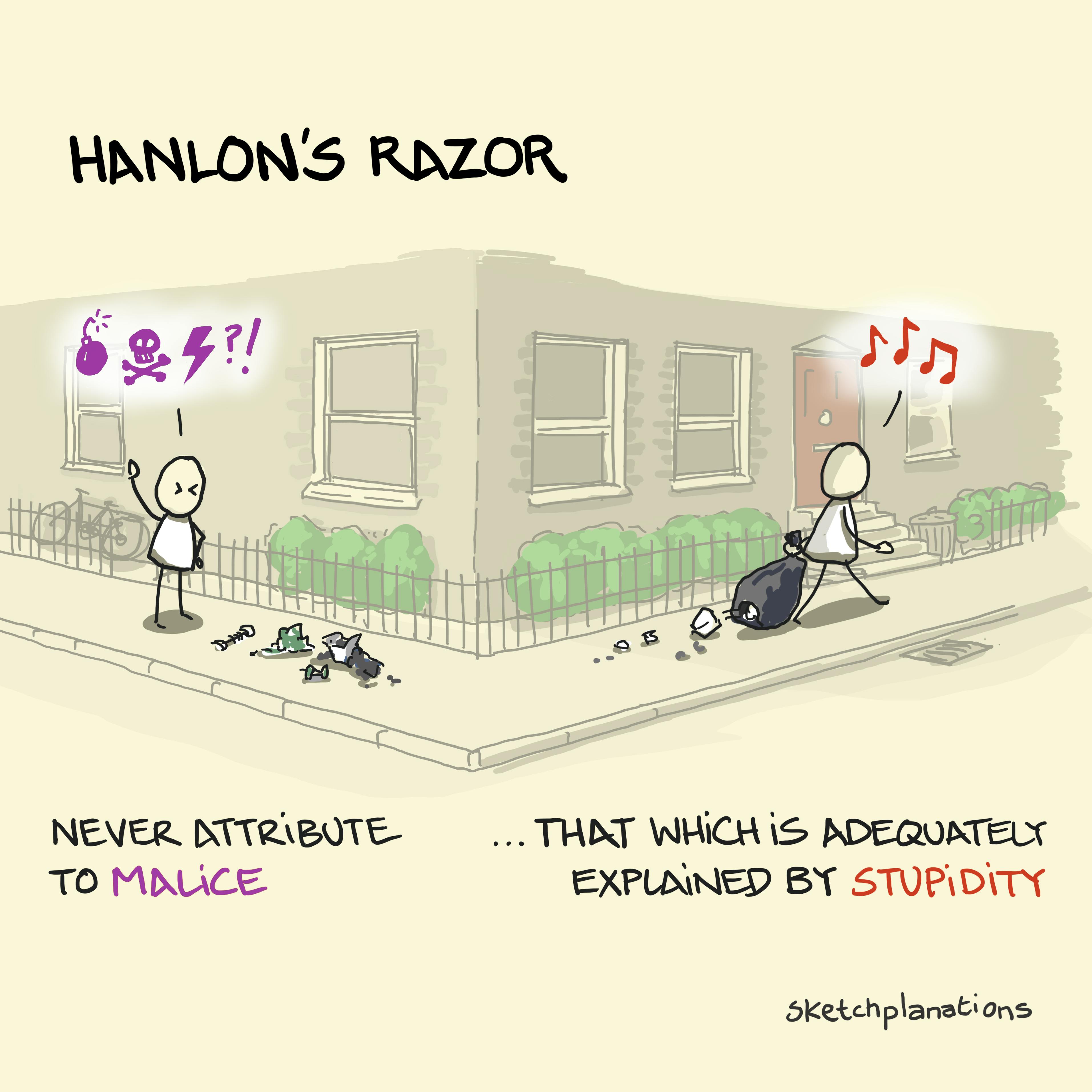Hanlon's Razor

👇 Get new sketches each week
Hanlon's Razor is the adage: "Never attribute to malice that which is adequately explained by stupidity."
Or sometimes, "Never attribute to malice what can be attributed to incompetence."
It appears in a similar form by the inimitable Johann Wolfgang von Goethe as, "And I have again observed, my dear friend, in this trifling affair, that misunderstandings and neglect occasion more mischief in the world than even malice and wickedness. At all events, the two latter are of less frequent occurrence," in The Sorrows of Young Werther . The same sentiments are also shared by William James, Churchill, and H.G. Wells. More recently, Douglas Hubbard gave a more modern version in his book The Failure of Risk Management: Why It's Broken and How to Fix It : "Never attribute to malice or stupidity that which can be explained by moderately rational individuals following incentives in a complex system."
The mistake of assuming bad intentions was brought home to me when puzzling why people kept leaving paper towels in the sinks of the bathrooms at university. How hard is it to put them in the bin?? A year after assuming my fellow students were either lazy or inconsiderate or both, I was washing my hands when another student dried his hands on the towel, walked to the door, opened it by covering the handle with the paper towel — presumably to avoid the germs — and then aimed his paper towel at the bin which was between the sinks. He missed, and it landed in the sink as he walked off down the corridor. Suddenly, it was clear to me that the hygiene of the door handle was higher in consideration of towel-in-the-sink people than whether or not their towel hit their target (and whether it was worth checking if their towel had hit the bin). It made sense. Someone later moved the bin next to the door, and it didn't happen again.
Besides towels in sinks, I've seen people get mad at others pushing in line when the pushers-in didn't realise other people were queuing. I've seen drivers shouting at another driver who's in blissful ignorance of the trouble they've caused. I've seen agents blamed for terrible customer service when the system is at fault, and customer service blame users when the product is at fault. I've seen people despairing at others leaving litter in the park or on the street when animals had dragged out the mess overnight. I've seen people vilified for not moving down on a train when they weren't aware of the squeeze at the other end. And, usually, I think people aren't smart or capable enough, or in fact wicked enough, to carry out the conspiracies that people credit them for. Very often it's the person assuming bad intentions and getting mad who suffers the most.
To be sure, there are different degrees of negligence. We can all make mistakes, but if you're doing your taxes, it's not okay to make a mistake because you didn't read the instructions. If you're standing on a busy train, you owe it to others to be aware that you may be blocking an aisle, and we should do our best to make sure our rubbish stays where we put it. But none of us are perfect and so often I think Hanlon's Razor has some truth to it.
Perhaps a better formulation of Hanlon's Razor would be, "Before attributing to malice, try attributing to incompetence." But I'm not a fan of the wording with 'stupidity' or 'incompetence'. Awareness is so often the necessary start and what's missing.
Since posting this, a few people also shared with me Clarke's Corollary: "Any sufficiently advanced incompetence is indistinguishable from malice." And another relevant name for a similar situation is Cock-up Over Conspiracy .
Source for Hanlon's Razor
Hanlon's Razor, which encourages us first to consider innocent mistakes rather than assuming ill will, was a submission to Murphy's Law, book two: more reasons why things go wrong , by Arthur Bloch (p52). Murphy's Law is "If anything can go wrong, it will." I've also previously covered Muphry's Law, where, when criticising spelling or grammar, you will make a spelling or grammar mistake yourself.
Related Ideas to Hanlon's Razor
Also see:
- Fundamental Attribution Error (someone shared Hanlon's Razor with me on posting this)
- Attribution bias
- Self-serving bias
More conjectures and thinking named after people:
- Chesterton's fence
- Russell's teapot
- Bloom's taxonomy
- Maslow's hierarchy
- Muphry's Law
- The Peter Principle
- The Generalised Peter Principle
- Hofstadter's Law

